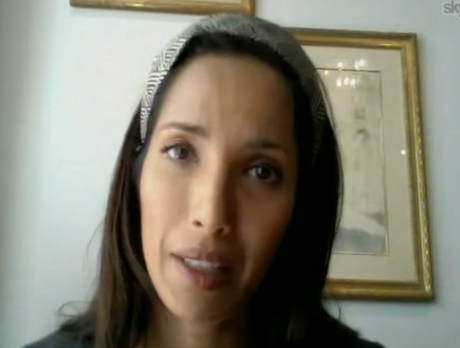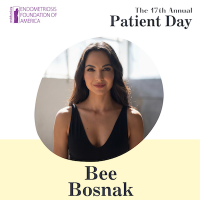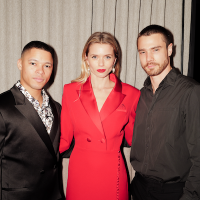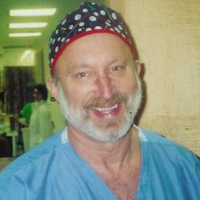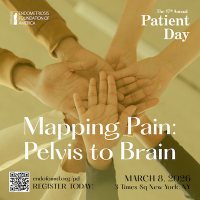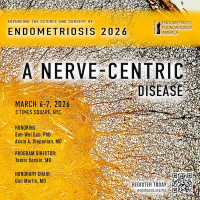Speaker 1: This morning's program will focus on awareness, research, surgical treatment, and novel classification of endometriosis, an often devastating disease that affects over 176 million women around the world. At one time not so long ago, we thought endometriosis affected primarily upper middle class Caucasian women. We now realize through awareness and enhanced diagnostic abilities that endometriosis has no ethnic or social preference. It is often first discovered in adolescents suffering from dysmenorrhea, as well as perimenopausal women with an adnexal mass. It is our duty to help these patients who would otherwise suffer their entire reproductive life. We are privileged this morning to hear and see four individuals who have made profound contributions to women's suffering with endometriosis. Ms. Padma Lakshmi, Dr. Linda Griffith, Dr. Grace [Janek 00:01:19], and Dr. Mauricio [Abreyo 00:01:20]. I will introduce each of them individually prior to their presentation.
Ms. Padma Lakshmi is an Emmy-nominated internationally known actress and television host, a food expert, award-winning author of two bestselling books, an entrepreneur, a supermodel, an activist who speaks five languages. She's graced the covers of numerous magazines and is easily one of the most recognizable faces in the world. While flying on JetBlue last week, I saw Padma make a guest appearance on 30 Rock, where she announced to Alec Baldwin that she had invented a resealable plastic bag that you can actually put a sandwich into, and one you can actually see through. She obviously has a wonderful sense of humor. Padma struggled with endometriosis herself for decades. After meeting our colleague Dr. Tamer Seckin, she was successfully treated and now has a beautiful daughter as a result. As one might expect from such an accomplished individual, Padma had the drive and gift to give back and help others with endometriosis. She teamed up with Dr. Suchkin to create the Endometriosis Foundation of America, an organization committed to enhancing the public's awareness of this disease.
Padma routinely speaks to the media, top researchers, and doctors, as well as to the public. In 2011 alone, she and Dr. Seckin garnered over 320 million media impressions, catapulting endometriosis into the spotlight. Pam has also enlisted the help of Susan Sarandon, Dr. Mehmet Oz, Fareed Zakaria, Whoopi Goldberg, and many others. It is a true honor to have Padma Lakshmi accept our invitation to present at the Jordan Philips Keynote Session. I'm excited to hear her story.
Padma Lakshmi: Good morning. Can you guys hear me okay?
Speaker 1: Yes.
Padma Lakshmi: Yes? Go? Good morning. I am very sorry that I couldn't be there in person. I was really looking forward to it. Unfortunately, because of personal reasons, I had to remain in New York, but I'm still very, very honored and privileged to be able to speak to all of you this morning. My name is
Padma Lakshmi, and I'm here on behalf of the Endometriosis Foundation of America. I'm a board member and a co-founder along with Dr. Tamer Seckin. Endofound is focused on combating the devastating effects of endometriosis, and all of its painful ramifications. We seek to raise awareness. We seek to educate. We seek to further and promote research, so that we can better understand the pathology of this disease, and we also support any kind of patient advocacy and legislative advocacy that can help, including helping underprivileged women get the treatment that they need. As an organization, we believe that the gold standard for treatment of this illness is through surgery, and through resection.
Can they hear me? They can. Right. Okay. You are surrounded by people who are very imminent. You'll hear from all of them today, and they can speak to you about the science of endometriosis. They will speak to you about the technological aspects of laparoscopy, as well as the technical aspects of the disease, but today I'd like to spend some time speaking to you about the human ramifications of this illness. I have stage four endometriosis. I am a college-educated professional woman, and I was 36 before I was ever diagnosed. I have access to the best medical care, as well as being lucky enough to afford very good health insurance, and yet I was misdiagnosed, first undiagnosed, and then misdiagnosed for decades of my life. I've always had very difficult period. From the time I was 13, I had pain. I had back pain. I had cramps. I had headaches. I had nausea. I had gastric problems. The face you see today in front of you is mine. It's one woman. It's one story, but behind me you should imagine that there are 10 million women standing behind my face.
While you see one face, it's really a multitude. 10 million people, 10 million women and adolescent girls in this country alone suffer from endometriosis. 176 million suffer from it worldwide, and the tragedy is, it's a disease that can be treated. It's a disease that does not have to overcome your life, and yet slowly and slowly and surely, it did overcome mine. I spent 25% of my life having my period. My period lasted seven or eight days. From the time I was 13, I would be routinely bedridden four or five of those days a month. I would miss family occasions. I would miss my studies, or exams. I would miss sporting events. When I became a working woman, I missed professional obligations due to my illness. From a very young age, I was on very serious narcotic medication in order to deal with the pain. As I traveled after college, I became familiar with the medical institutions of other countries, and also the drugs of other countries. What is Vicodin called in other countries? Some countries don't even let you use it anymore. What is Anaprox, or Naprosin?
I always knew that this would be so because my mother, who is also a nurse, and very smart, and educated, told me when I was very young, and talked to me about my body, that I would probably suffer every month with all the symptoms that I did indeed get once I got my period. I had, again, back ache, mood fluctuations, swelling and bloating, severe, severe cramps, severe and excessive bleeding. I had lower back pain. I had digestive problems. I had nausea, and the biggest thing that I suffered from, I would say, is just a loneliness of not understanding why I suffered from this and other women did not. I was told that it was my lot in life, that maybe I was high strung, that maybe that I was just delicate, or had a low threshold for pain. The pain is your body's way of telling you that something is wrong, and when you look at these eyes, you have to know that month after month as a young girl, when your body fails you, you start to feel less than the woman next to you.
I went on like this for most of my adolescence. I went on like this for most of my twenties. I once started hemorrhaging in Paris when I was with the mayor, and I went to the hospital, and the doctor asked me if I had missed one of my birth controls, that that sometimes caused it, but he never said the words endometriosis to me at that hospital. I moved back to the States, and I went to see a gynecologist here, and he informed me that I had some ovarian cysts. He did that surgery almost 10 years ago, and he said the words blood filled. He said I had a ... One of my cysts were blood filled, but that he was going to remove it, and it should be fine, and then he needed to remove it soon, but he never said the words endometriosis to me. Then I was having dinner one night in 2006, and I got very severe cramps, and I was feeling very uneasy, and I went home, and I felt very ill, and I called my internist, and he said, "Just drink some mint tea," because usually that will help you with spasms.
I thought, we are way beyond mint tea here. We are just somewhere in some other forest. He couldn't make it to my house, and then finally the ambulance came and took me away, and hours later, they did an emergency surgery through laparoscopy that was gastric, but done by the gastric surgeon, and still I didn't hear the words endometriosis. I heard that I have a propensity for scarring, and that perhaps maybe there was some scar tissue that had looped itself around my intestines, scar tissue from when the other doctor years before had removed the ovarian cysts. That episode was just the tip of the iceberg, and I would encourage every doctor or surgeon who is operating in the body cavity to explore the symptoms of endometriosis to consult their colleagues about possible misdiagnosis because it happened to me. The doctor who performed that surgery is a well-meaning, reputable, wonderful man, and I fully believe that he wanted to give me the best care possible, the care he would have given his own daughter, or sister, or wife. He just didn't know.
I partnered with Seckin in order to never have that happen again to young girls. I have a daughter now. I'm lucky enough to be a mother, and I didn't want her or my nieces or younger members of my family to go through what I went through. I would often hide my pain. I would, when I missed family occasions, I was embarrassed, and I just wouldn't even say that, after a while that it was my period pain, and people just thought I was flaky. After that surgery, the doctor told me, "You'll be fine. I think that that little piece of scar tissue had wrapped around your small intestine very, very tightly because even when I snipped it off, I had to massage it in order for it to spring back." I thought, "Yeah, I know, because the cramps were so, so bad." They were just so debilitating, and I think that's the thing that's the hardest, is that when you have chronic pain, and other symptoms, it affects every part of your life. Endometriosis effects every aspect of a woman's life. It affects your personal relationships, platonic and sexual.
It affects your mood. It affects your hormones. It affects her ability to do her job and earn a living effectively. It affects her ability to be present for the members of her family and her community, and it affects her sexuality. Endometriosis is also a disease that's very misunderstood or not understood by many, many physicians, even in the fields of gynecology and obstetrics. I, as I said, I had access to all these amazing doctors, and yet it took me two surgeries before I got to Dr. Seckin. Finally, I did get to him. I'll never forget it. I was at a photo shoot, and I started bleeding in the middle of my cycle. I didn't know why, and I was used to bleeding excessively during my period, and having lots of pain. I was used to even having pain during ovulation for two and three days. I could literally feel the pain moving from one side of my mid rift from bottom to top, or I could tell, and people said, "It's impossible. You can't tell." I said, "No." I could tell.
When I started bleeding, I just had my assistant go out and get me some tampons, but I didn't need tampons. What I needed was medical attention. That night I called my internist, and I told him what happened, and he said, "You know, I'm always worried about you, because you're always on a heating pad. You're taking very serious pain medication, and this just shouldn't be." I said, "Well, I go to a gynecologist." He said, "Well, I have a friend who's a specialist. Why don't you go see him?" I'll never forget the day I walked into Dr. Seckin's office. I remember it was in morning, or it was a day much like this in New York. It was fall. It was October. I had done a cooking segment very early that morning on a morning TV show, and I had a big, full schedule that concluded with a very swanky dinner that evening. Somewhere in there, at the end of the day, I walked into Dr. Seckin's office. He asked me a bunch of questions, which I answers to the best of my ability, and then he examined me. He asked permission to do another type of exam.
I said, fine. I had never had that kind of exam before, which I'll tell you is not fun. I know you guys are all medical professionals, but as a patient, it can be very scary. It can be very scary, and very lonely, even if there are people holding your hand. After he finished the exam, he asked me to get dressed, and he said, "I'll meet you in your office." I'll never forget, I was texting, or emailing, or something, because I was always late for whatever I was doing, and I said, "Is this gonna take long?" He said, "Yeah." He said, "Ms. Lakshmi, this is going to take long." He said, "I believe you when you say you think you told me all you knew honestly to the questions that I asked you before examining you, because you walked into my office on your own two legs, but your anatomy does not match your story. Your anatomy makes me wonder why you're not lying down on the sidewalk in front of my office squealing in pain.
"Ms. Lakshmi, I believe that you've been in pain so much you don't even know it's pain, and that you've sublimated all of your pain so that you can deal with it, but something is very, very wrong, and we need to operate. We need to get rid of this illness as much as we can. We need to treat it, soon, because I don't want to make presumptions, but I'm assuming you would like the option to be a mother, and Ms. Lakshmi, that option is gravely in danger now." He said the word that made it all understandable. He said, "You have endometriosis." He told me what it was. He told me what it did, and for the first time somebody finally put a name on all of the things that I couldn't explain. The incredible pain. The ache. Sometimes my whole hip just go numb. Sometimes I would be curled up in a ball, and no amount of Vicodin would help, or it would make me really nauseous, and that was often just as bad. The heating pads, the hot water bottles, the handfuls of Advil. I can't tell you what it was like.
The collateral symptoms that all of those medicines caused. Finally someone put a name to what was wrong. I wasn't high strung. I wasn't delicate. In fact, I had really high threshold for pain, it turned out, and I wasn't being overdramatic. I just had a disease that needed treatment, and those other doctors who operated on me, who meant well, thought they were giving me the best care, just didn't know either. They didn't know any better, just like I didn't know any better, and they should. As surgeons, and professionals, and scientists in your field, you have a lot of power. You have an immense capacity to change the very caliber and quality of a woman's life, a woman like me, a woman who didn't understand why her body was betraying her. A woman who didn't want to miss the milestones of her life, or the family functions and events that are important to every young girl, and every woman. Endometriosis affects 176 million women a year. It is something that can be treated, that can be managed. At Endofound, we believe that that should be managed preferably with surgery, if possible.
We want to educate as many women and as many health professionals as possible. Part of that is having centers for excellence, so that we can educate a next generation of doctors, as well as nurses. Nurses are our first line of defense often, and they are the first ones to see young girls. Endometriosis, if caught early, can be treated. It can change the course of a girl's life. If I had been diagnosed at 20 rather than at 36, imagine, imagine the difference in my life. Excuse me. Imagine how many more things I could have done, how many more events that I would have been able to go to, how much money I could have made as a professional woman. All of these things. How much more I could have contributed to the community in which I live. We are at a very, very special place in medical science, in medical history, where we have the technology to treat the illness that we didn't have a few decades ago, and you, all of you sitting in the room can help. We had a nurse's conference earlier this year because young girls will not go to a gynecologist.
I didn't want to go to a gynecologist. I still don't like going, in spite of loving Dr. Seckin and being so thankful that I met him, but we need to educate the lay people about the disease. We need to educate young women. We believe in legislative advocacy not even to forward research, but also to change programs in medical colleges, and also to change programs about sex education. Young girls should learn about the possibility of endometriosis. They are learning about the other aspects of their own sexuality and their own bodies. We seek to further research. We have also partnered with Dr. Linda Griffith, and you will hear more from her later today at MIT about looking at the pathology of this illness. What you really ... What it all boils down to is the human condition, how this affects not only the woman who has endometriosis, but her family. Dr. Seckin told me that that first surgery would be about an hour and a half, he thought. Once he got in there, it wound up being four and a half hours of surgery.
I was a bedridden for a long time after that surgery, and then I had another surgery, and a third surgery, and I'm happy to report that now I'm not bedridden. Now I don't take handfuls of Vicodin. Now I am nicer to the people around me. I am more productive, and most of all, I feel understood, and I feel I have an understanding of what my body is doing, and how I can help it function in a healthy manner. That's really what this is about. This is about helping women to be healthy, and productive human beings, and contribute into the world that they live in. That's the best thing we can do for our fellow human being. We can offer them the same opportunity to have a full and productive life. Just like the next person. When you have endometriosis, you feel very, very lonely. I didn't know what was wrong with me. I would swell. I would spontaneously have to run to the bathroom and throw up. I would have severe, debilitating cramps, and once I found out what it was, and realized that had I received this same treatment, the same medical attention that I had received at 36 at even 23, at 25, it made me angry.
It made me angry because I wasn't sitting in some village without access to medical care, or without the financial means to treat whatever was wrong with me. I just, I was undiagnosed and misdiagnosed, and I don't want the next generation of women to suffer with what I went through. I feel that if there's anything that I can impart to all of you today, it's that I'm just one face. I'm just one face in 10 million in this country. I'm just one face in 176 million in this country. After I had all those surgeries, I went through a divorce, and I am convinced that endometriosis severely affected my marriage. Without violating the privacy of my family, I won't go into that, but you can just imagine all the things that I'm talking about. I decided to explore my own fertility, and so Dr. Seckin and I went to a very nice fertility place here in New York, and when, as you all may know, when you do that, they do a battery of tests, and I was told that my ovaries were even older than I was.
No matter how good you feel about yourself at 39, you don't want to hear that from anybody. I was told that I would probably never be able to have children naturally. Dr. Seckin wound up removing one of my fallopian tubes in one of the surgeries, and in a prior surgery, I had had part of my left ovary removed as well, so I explored the possibility of becoming pregnant at such a late stage when ... It's not uncommon. Most women are waiting until their late thirties and early forties to explore their fertility, and if you've never explored the possibility of having children until then, you're not sure if you can or not, because unlike me, some patients with endo are completely asymptomatic, and now my generation of women is waiting longer and longer to have children, and endometriosis is one of the leading causes of infertility. I would like to challenge all of you to make sure that you talk about this illness with your colleagues after you leave this conference this weekend.
I would like to challenge all of you to talk about this illness with your family, because chances are you have someone in your life, maybe more than one person, who suffers from this ailment. Do understanding at Endofound we seek to educate, forward research. We do legislative advocacy, and we promote awareness, and I would like to enlist everyone there today to do the same. Help us help other women get the treatment that I so needed and got. Help other women to lead happy, healthy, productive lives. It's a very lonely illness. I've met professional women who had the disease and lied about it to their faculty, who had eight, nine surgeries resulting in a hysterectomy. I've met women who can't afford the surgery, and just go on, and eventually just break down, and like I did, get sent to the emergency room. I've met women who are 23 years old and had hysterectomies, and the terrible thing is that this doesn't have to be so. I'd like to end with something happy. I met a nurse, and her name is Melanie, at the conference. We had a nurses conference at Lennox Hill Hospital here not to long ago because school nurses, again, we believe are the first line of defense for young girls.
I had no idea she was a nurse, but she looked very familiar to me, and she said that she had had such excruciating pain all her life, and that she contacted us, and that we were able to get her the surgery she needed. Melanie then came back with her colleagues to our nurses conference, and decided she was going to help us help other women. I'd like to enlist all of you to do the same. I'm on the other side of my disease now. I'm a mother. I'm a happier person. I'm a healthier person, and it's my life's mission to help other women not go through what I went through. Sometimes when I'm laying awake at night, and I look at my daughter as she's sleeping, I think, "Why do I have to go through all that pain? Why didn't I find out about this before?" I like to think that maybe it was meant to be, that all my undiagnosis, and misdiagnosis, and all the pain that I suffered were so that I could open my mouth, and I could speak to all of you today about this illness, so that the pain that I went through could be utilized.
It could be turned into power. Power to educate, power to research, power to combat pain, and suffering, and power to be healthier for the next generation of women. Thank you so much for letting me speak with you this morning. I really appreciate it. That's my story.
Speaker 1: Padma, on behalf of the AHEL, we really, really appreciate your taking the time to share your story. It's incredibly inspirational, and we also appreciate all your efforts in promoting awareness. We are going to have to skip the question and answers because we're just running a little behind, but again, thank you very much for being with us today. Padma, on behalf of the AHEL, we really, really appreciate your taking the time to share your story. It's incredibly inspirational, and we also appreciate all your efforts in promoting awareness. We are going to have to skip the question and answers because we're just running a little behind, but again, thank you very much for being with us today.



